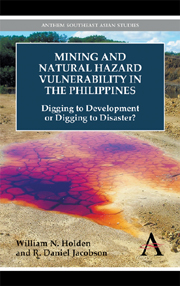 Mining and Natural Hazard Vulnerability in the Philippines
Mining and Natural Hazard Vulnerability in the Philippines Book contents
- Frontmatter
- Contents
- Acknowledgments
- List of Tables and Figures
- List of Acronyms
- Introduction
- Chapter One Mining in the Philippines
- Chapter Two Government Efforts to Encourage Mining
- Chapter Three Environmental Effects of Mining
- Chapter Four Mining amid Natural Hazards
- Chapter Five Technocratic Responses to the Risks
- Chapter Six Risk Society in the Philippines
- Chapter Seven Mining as a Flawed Development Paradigm
- Chapter Eight Is Another World Possible?
- Conclusion
- Bibliography
- Index
Chapter Two - Government Efforts to Encourage Mining
Published online by Cambridge University Press: 05 May 2012
- Frontmatter
- Contents
- Acknowledgments
- List of Tables and Figures
- List of Acronyms
- Introduction
- Chapter One Mining in the Philippines
- Chapter Two Government Efforts to Encourage Mining
- Chapter Three Environmental Effects of Mining
- Chapter Four Mining amid Natural Hazards
- Chapter Five Technocratic Responses to the Risks
- Chapter Six Risk Society in the Philippines
- Chapter Seven Mining as a Flawed Development Paradigm
- Chapter Eight Is Another World Possible?
- Conclusion
- Bibliography
- Index
Summary
The Ascendency of Neoliberalism
Modernity: Trust and confidence in experts
The word “modern,” in its Latin form modernus, was first used in the late fifth century in order to distinguish the (then) present, which had become officially Christian, from the Pagan past (Habermas 1981). Modernism is infused with a belief (inspired by science) in the infinite progress of knowledge and in the infinite advancement of humans towards social betterment. “Generally perceived as positivistic, technocentric and rationalistic, universal modernism,” wrote Harvey (1990, 9), “has been identified with the belief in linear progress, absolute truths, the rational planning of ideal social orders and the standardization of knowledge.” In large part, modernism is centered on “the rationality of human beings, the privileged status of science as the only valid form of knowledge, the technological mastery of nature [and] the inevitability of progress” (Warf 1993, 162). An essential component of modernity is trust and confidence in experts. As Escobar (1996, 55) wrote: “One of the defining features of modernity is the increasing appropriation of ‘traditional’ or pre-modern cultural contents by scientific knowledge and the subsequent subjection of vast areas of life to regulation by administrative apparatuses based on expert knowledge.”
Economics as a discourse of modernity
The trust and confidence in experts, which is a hallmark of modernity, applies very much to capitalism. The history of capitalism is intimately linked with the advancement of scientific discourses of modernity in the discipline of economics.
- Type
- Chapter
- Information
- Mining and Natural Hazard Vulnerability in the PhilippinesDigging to Development or Digging to Disaster?, pp. 35 - 58Publisher: Anthem PressPrint publication year: 2012


